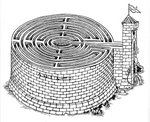Klingt nach einem guten Plätzchen. Nichts wie hin!
HEISS umfehdet,
wild umstritten
Liegst dem Erdteil du inmitten,
Einem starken Herzen gleich
(Hotly fought over,
fiercely contested,
You lie at the centre of the continent,
Like a strong heart).

The anthem's prophecy took 40 years to come true, but it now seems spot on.
Twenty-first-century Austria seems comfortable in its skin. It has come to terms with being small and is beginning to see the advantages. Within the EU it may not carry the clout of a Germany or a France, but there are plenty of other small members with which it can make common cause. Its neutrality, forced on it after the second world war, has proved not only convenient but sufficiently flexible to suit changing circumstances. It generally gets on well with its western neighbours.
A predominantly Catholic country, Austria wears its faith lightly. When the pope came to visit in September, the crowds were welcoming but not ecstatic. Some commentators described him as “cool”. Austria's stance on social issues is relatively liberal: abortion and homosexuality were legalised in the 1970s, though gay marriage has yet to arrive. The country is proud of the fact that it recognised Islam as an official religion back in 1912.
Austria's system of proportional representation, which tends to produce coalition governments and often grand coalitions, may lack the cut and thrust of a first-past-the-post system, but it appears to reflect the wishes of its people. Its tradition of “social partnership” between employers and employees may seem opaque, but it has ensured a long period of social peace and moderate pay settlements. Its welfare state, though not as lavish as those of the Nordic countries, keeps its citizens fairly comfortable in adversity and allows many to achieve their ambition of “retiring well” (on 90% of previous net income for the average earner). The once excellent education system is showing signs of wear and tear, but remains good in parts.
Trains, trams and buses generally run on time. The country's beautiful scenery of mountains, lakes and forests, looked after by an environmentally conscious people, offers a high quality of outdoor life, as well as bringing in lots of well-heeled tourists. And Austrians have no need to worry about nuclear mishaps on their soil: the only nuclear power plant, at Zwentendorf, was mothballed nearly 30 years ago.
Indoor life benefits from generous state spending on culture, not just on Mozart and the Johann Strausses but experimental stuff as well. On a more quotidian level, Austrians are among Europe's most avid newspaper readers (though some of the mass-circulation press is unedifying).
They work just as hard as the Germans or the Swiss, but they are also more relaxed and less pernickety.
AUSTRIANS love to complain, but when it comes to their economy even they admit that they are currently grumbling at a high level.
Der Artikel über österreichische Innenpolitik ist betitelt als:
Sleeping with the enemy - Austria's way of resolving political conflicts
THEY call it a “consensus democracy” or “democracy by negotiation”, and it is tailor-made for their particular needs.
Austrians are good at striking compromises. Hannes Androsch, a former vice-chancellor turned businessman, explains that in Germany the word grundsätzlich (in principle) means “no”; in Austria it means “yes”. Disagreements are resolved by sitting round a table and talking until everybody has got a bit of what he wants.
